Jacques Bon & Drux A Long Way 2xLP (Smallville)
 Move D and Benjamin Brunn’s Songs From The Beehive was a formative techno full-length for yours truly, a minimal tech-house album that saved plenty of space for all its warm, weird, fuzzy underpinnings, wisely adorned by the cover’s colorful splots. Fourteen years later, German label Smallville continues that same mission of funky, non-aggressive tech-house with this new one from Jacques Bon and Vincent Drux (and just like Songs From The Beehive, its cover was also designed by Smallville’s in-house artist Stefan Marx). Bon and Drux do a great job of ignoring the past decade of electronic music’s multitudinous trends, sticking with a rich tech-house sound designated by booming bass-lines, hazy synths, pleasant levels of reverb and a consistently casual pulse. Nothing fancy or designed to provoke, just solidly-constructed tech-house with subtle detailing here and there. It feels very much in line with Perlon’s ’00s roster, the sort of thing that could be accompanied by a Villalobos or Luciano remix on the b-side. Though this one isn’t quite emo enough to be confused with the Giegling roster, they both inspire me to wish I was in some sleepy German town raving in a cobblestone courtyard flanked by coffee shops and a babbling brook. Not an essential release, though A Long Way conjures an essential feeling, which I insist you locate somewhere else if not here.
Move D and Benjamin Brunn’s Songs From The Beehive was a formative techno full-length for yours truly, a minimal tech-house album that saved plenty of space for all its warm, weird, fuzzy underpinnings, wisely adorned by the cover’s colorful splots. Fourteen years later, German label Smallville continues that same mission of funky, non-aggressive tech-house with this new one from Jacques Bon and Vincent Drux (and just like Songs From The Beehive, its cover was also designed by Smallville’s in-house artist Stefan Marx). Bon and Drux do a great job of ignoring the past decade of electronic music’s multitudinous trends, sticking with a rich tech-house sound designated by booming bass-lines, hazy synths, pleasant levels of reverb and a consistently casual pulse. Nothing fancy or designed to provoke, just solidly-constructed tech-house with subtle detailing here and there. It feels very much in line with Perlon’s ’00s roster, the sort of thing that could be accompanied by a Villalobos or Luciano remix on the b-side. Though this one isn’t quite emo enough to be confused with the Giegling roster, they both inspire me to wish I was in some sleepy German town raving in a cobblestone courtyard flanked by coffee shops and a babbling brook. Not an essential release, though A Long Way conjures an essential feeling, which I insist you locate somewhere else if not here.
Carcáscara 2 LP (Hegoa)
 Very pleasant combination of modern minimalism and traditional folk here from Carcáscara and their Basque Country residence. I appreciate a group that takes fifteen years to follow their debut, which is the case with Carcáscara’s 2 – they clearly aren’t pumping out content for the sake of it. 2 opens with a softly chiming acoustic guitar and sweet vocals reminiscent of Devendra Banhart’s early studio albums, but the album opens outward from somewhat traditional folk music to a sprawling suite of harmonium, pitched percussion, melodic vocals and plenty of resonant classical guitars. The label references John Fahey and Robbie Basho as influences, and while Carcáscara employ plenty of cascading acoustic guitars throughout, there’s a clear path to the many modern artists who utilize cyclical patterns as an almost meditative practice as well, from the tempered percussion of De Leon to the healing grooves of Joshua Abrams Natural Information Society. But whereas the work of many modern “fourth-world” ambient players can feel as thought it was stitched together on a laptop, the music of Carcáscara is particularly organic and natural-sounding. The sustained drone of a synth on “Aries Resurrection” is clearly electronic, but the rich tones that quickly envelop it could be flutes, an old organ, or something else entirely. All of these songs feel as though they were carefully rendered by human hands, and that tenderness has seeped into every crevice of this charming album.
Very pleasant combination of modern minimalism and traditional folk here from Carcáscara and their Basque Country residence. I appreciate a group that takes fifteen years to follow their debut, which is the case with Carcáscara’s 2 – they clearly aren’t pumping out content for the sake of it. 2 opens with a softly chiming acoustic guitar and sweet vocals reminiscent of Devendra Banhart’s early studio albums, but the album opens outward from somewhat traditional folk music to a sprawling suite of harmonium, pitched percussion, melodic vocals and plenty of resonant classical guitars. The label references John Fahey and Robbie Basho as influences, and while Carcáscara employ plenty of cascading acoustic guitars throughout, there’s a clear path to the many modern artists who utilize cyclical patterns as an almost meditative practice as well, from the tempered percussion of De Leon to the healing grooves of Joshua Abrams Natural Information Society. But whereas the work of many modern “fourth-world” ambient players can feel as thought it was stitched together on a laptop, the music of Carcáscara is particularly organic and natural-sounding. The sustained drone of a synth on “Aries Resurrection” is clearly electronic, but the rich tones that quickly envelop it could be flutes, an old organ, or something else entirely. All of these songs feel as though they were carefully rendered by human hands, and that tenderness has seeped into every crevice of this charming album.
Chat Pile God’s Country LP (Flenser)
 It’s both cool and a little weird that some people seem extremely psyched on the debut album from Oklahoma City’s sludge / noise-rock outfit Chat Pile. This sorta aggro, noisy, mid- to slow-paced rock thing felt like its moment came a decade ago, but I personally find it an endearing sound regardless of time period, so long as it’s performed with style and intent. Chat Pile manage to merge the sludge-rock that filtered through the hardcore scene in the ’90s (think of Cavity, Gob, Deadguy and Floor) with some of Korn’s down-tuned groove and the “I’m a crazy guy who’s losing it” vibe of Daughters’ last (and presumably final?) record. It’s good! Chat Pile are clearly trying to write memorable songs rather than fill up a space with sound. Although a well-intentioned track like “Why” reeks of “31 year-old white guy realizes the world is bad”, they have some great moody moments that verge on Alice In Chains-level brutality, like “Anywhere” and even “Why”‘s lumbering opening riff. Not sure you’ll need to hear “I Don’t Care If I Burn” more than once, but it’s cool that Chat Pile are trying to create their own thing rather than follow the established blueprint. Many bands who attempt this style focus on the sound and aesthetic rather than the songs themselves, but God Country is a dynamic record, notably replayable in a genre that often prides itself on grueling monotony.
It’s both cool and a little weird that some people seem extremely psyched on the debut album from Oklahoma City’s sludge / noise-rock outfit Chat Pile. This sorta aggro, noisy, mid- to slow-paced rock thing felt like its moment came a decade ago, but I personally find it an endearing sound regardless of time period, so long as it’s performed with style and intent. Chat Pile manage to merge the sludge-rock that filtered through the hardcore scene in the ’90s (think of Cavity, Gob, Deadguy and Floor) with some of Korn’s down-tuned groove and the “I’m a crazy guy who’s losing it” vibe of Daughters’ last (and presumably final?) record. It’s good! Chat Pile are clearly trying to write memorable songs rather than fill up a space with sound. Although a well-intentioned track like “Why” reeks of “31 year-old white guy realizes the world is bad”, they have some great moody moments that verge on Alice In Chains-level brutality, like “Anywhere” and even “Why”‘s lumbering opening riff. Not sure you’ll need to hear “I Don’t Care If I Burn” more than once, but it’s cool that Chat Pile are trying to create their own thing rather than follow the established blueprint. Many bands who attempt this style focus on the sound and aesthetic rather than the songs themselves, but God Country is a dynamic record, notably replayable in a genre that often prides itself on grueling monotony.
Claude A Lot’s Gonna Change LP (American Dreams)
 Unrepentantly chill debut full-length here from Chicago’s Claude, who successfully coalesces a few different strands of popular underground pop (dream-pop, chill-wave, synth-pop). Her songs range from smoky slow-dances to caffeinated electro-pop, all unified by her confident and well-enunciated voice. She casually speak-sings for the most part, with each syllable sounding carefully considered and unhurried, and her delivery is probably the biggest draw for me. It’s so easy to sound disaffected and over-it these days, especially with echo-y synths and electronic programming, but Claude comes across as sincere and considered, willing to give a little of herself even if it means risking vulnerability. The album opens with a song about being in her twenties (“Twenty Something”), whereas I feel like most solo electro-pop singers would avoid admitting something as real as their age, no matter if they’re in their twenties or their sixties. I hear some Lana Del Rey, Tamaryn and Cocteau Twins in these songs, but also unlikelier artists like Pulseprogramming and The Postal Service (“What’re You On Tonight”) or, I dunno, Molly Nilsson covering That Dog (“Claustrophobia”)? Whenever I recognize a nice wide spread of related-unrelated artists in a record, it usually means I dig it, which is certainly the case here. Best twenty-something album of the month!
Unrepentantly chill debut full-length here from Chicago’s Claude, who successfully coalesces a few different strands of popular underground pop (dream-pop, chill-wave, synth-pop). Her songs range from smoky slow-dances to caffeinated electro-pop, all unified by her confident and well-enunciated voice. She casually speak-sings for the most part, with each syllable sounding carefully considered and unhurried, and her delivery is probably the biggest draw for me. It’s so easy to sound disaffected and over-it these days, especially with echo-y synths and electronic programming, but Claude comes across as sincere and considered, willing to give a little of herself even if it means risking vulnerability. The album opens with a song about being in her twenties (“Twenty Something”), whereas I feel like most solo electro-pop singers would avoid admitting something as real as their age, no matter if they’re in their twenties or their sixties. I hear some Lana Del Rey, Tamaryn and Cocteau Twins in these songs, but also unlikelier artists like Pulseprogramming and The Postal Service (“What’re You On Tonight”) or, I dunno, Molly Nilsson covering That Dog (“Claustrophobia”)? Whenever I recognize a nice wide spread of related-unrelated artists in a record, it usually means I dig it, which is certainly the case here. Best twenty-something album of the month!
Caleb Dailey Warm Evenings, Pale Mornings: Beside You Then LP (Moone / Alien Transistor)
 Moone label-head (and occasional Soft Shoulder member) Caleb Dailey bears his tear-stained, denim-clad heart on his solo debut, Warm Evenings, Pale Mornings: Beside You Then. Sometimes, we best express ourselves through the words of others, an approach Dailey favors here as this album consists entirely of covers, classic weepy country tunes written by Gram Parsons, Gordon Lightfoot and Blaze Foley. I’m sure these timeless gems would sound lovely performed on a broken washing machine and a theremin (that’d be better suited for a Gilgongo release), but Dailey gives them the proper rock instrumentation alongside a small collection of pals, adorning these songs with keys, pedal steel, banjo, harmonium and whatever else might be necessary to get the job done (including none other than Tori Kudo himself playing violin on “Brass Buttons”!). The recording is warm and lively; I’m reminded of some of those early Elephant 6 recordings where you can practically hear all the musicians shuffling their feet across the room, moving microphones and picking up instruments in a cluttered and convivial studio space. Played by one’s lonesome, these songs would be A-OK, but Dailey opens the blinds and lets their tender power shine (with a little help from his friends).
Moone label-head (and occasional Soft Shoulder member) Caleb Dailey bears his tear-stained, denim-clad heart on his solo debut, Warm Evenings, Pale Mornings: Beside You Then. Sometimes, we best express ourselves through the words of others, an approach Dailey favors here as this album consists entirely of covers, classic weepy country tunes written by Gram Parsons, Gordon Lightfoot and Blaze Foley. I’m sure these timeless gems would sound lovely performed on a broken washing machine and a theremin (that’d be better suited for a Gilgongo release), but Dailey gives them the proper rock instrumentation alongside a small collection of pals, adorning these songs with keys, pedal steel, banjo, harmonium and whatever else might be necessary to get the job done (including none other than Tori Kudo himself playing violin on “Brass Buttons”!). The recording is warm and lively; I’m reminded of some of those early Elephant 6 recordings where you can practically hear all the musicians shuffling their feet across the room, moving microphones and picking up instruments in a cluttered and convivial studio space. Played by one’s lonesome, these songs would be A-OK, but Dailey opens the blinds and lets their tender power shine (with a little help from his friends).
Doc Flippers Human Pork LP (Sophomore Lounge / Phantom / We Don’t Make It)
 Since the beginning, German punk has always been one of the weirder forms of punk, and Leipzig’s Doc Flippers continue that proud tradition with their full-length vinyl debut, Human Pork. The artwork calls to mind both Lumpy Records and Sam McPheeters, and that same sort of restless desire to agitate is prevalent throughout the album, even as there’s no hardcore (and mostly just the essence of punk) to be found. If anything, it seems like Doc Flippers are purposefully making fun of punk while simultaneously playing their own form of it, if that makes sense… it’s not irony, it’s more like a deliberate nose-thumbing at the audience as well as themselves. Some of their weird guitar licks recall some of those tape-only post-Coneheads projects and early Chronophage, all with the same “half a dozen people on stage” feel of Natural Man & The Flamin’ Hot Band. Throw in an instrumental funk break where the joke is that it’s actually kinda good, and then just speed it up on a loop over and over? Why not! It’s a wacky party for sure – someone’s getting pranked here, and if you’re not sure who it is that’s getting pranked, there’s a good chance it may be you.
Since the beginning, German punk has always been one of the weirder forms of punk, and Leipzig’s Doc Flippers continue that proud tradition with their full-length vinyl debut, Human Pork. The artwork calls to mind both Lumpy Records and Sam McPheeters, and that same sort of restless desire to agitate is prevalent throughout the album, even as there’s no hardcore (and mostly just the essence of punk) to be found. If anything, it seems like Doc Flippers are purposefully making fun of punk while simultaneously playing their own form of it, if that makes sense… it’s not irony, it’s more like a deliberate nose-thumbing at the audience as well as themselves. Some of their weird guitar licks recall some of those tape-only post-Coneheads projects and early Chronophage, all with the same “half a dozen people on stage” feel of Natural Man & The Flamin’ Hot Band. Throw in an instrumental funk break where the joke is that it’s actually kinda good, and then just speed it up on a loop over and over? Why not! It’s a wacky party for sure – someone’s getting pranked here, and if you’re not sure who it is that’s getting pranked, there’s a good chance it may be you.
420 420 LP (Lustwerk Music)
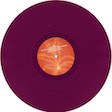 Gotta hand it to Galcher Lustwerk for behaving in a sporadic and confusing manner that simply doesn’t jive with way the world works today (relentless online content and promotion). Rather than constantly chiming in on social media, Lustwerk seems content to fade below the surface, which is cool with me… more artists should make their fans chase them rather than the other way around. Case in point is this album from 420 – it’s perhaps Lustwerk’s most uninspired moniker, though the music is as sweet as anything released under his primary name. This is rich, supple house music with Detroit and German influences, deployed under the cover of night and in the darkest crannies of the club. “Untitled 1” is the upbeat party-starter, its speedy bongos giving way to luscious pads redolent of DJ Central and Omar S. If anything, 420 leans closer to traditional techno than previous works (see the Drexciya-esque “Untitled 6”) but it fits him as well as the downtempo house he’s refined over the years. Lustwerk’s vocals have always been one of the most striking and distinctive aspects of his music, and while he doesn’t rap on all of these tracks, his staccato vocal lines remain the show-stealer, at once energetic yet fully reclined. There’s a lot of Lustwerk material out there, the majority of which shares the same sonic aesthetic, but 420 feels particularly fresh to me right now. More of the same, but when the same is so damn good, who could complain?
Gotta hand it to Galcher Lustwerk for behaving in a sporadic and confusing manner that simply doesn’t jive with way the world works today (relentless online content and promotion). Rather than constantly chiming in on social media, Lustwerk seems content to fade below the surface, which is cool with me… more artists should make their fans chase them rather than the other way around. Case in point is this album from 420 – it’s perhaps Lustwerk’s most uninspired moniker, though the music is as sweet as anything released under his primary name. This is rich, supple house music with Detroit and German influences, deployed under the cover of night and in the darkest crannies of the club. “Untitled 1” is the upbeat party-starter, its speedy bongos giving way to luscious pads redolent of DJ Central and Omar S. If anything, 420 leans closer to traditional techno than previous works (see the Drexciya-esque “Untitled 6”) but it fits him as well as the downtempo house he’s refined over the years. Lustwerk’s vocals have always been one of the most striking and distinctive aspects of his music, and while he doesn’t rap on all of these tracks, his staccato vocal lines remain the show-stealer, at once energetic yet fully reclined. There’s a lot of Lustwerk material out there, the majority of which shares the same sonic aesthetic, but 420 feels particularly fresh to me right now. More of the same, but when the same is so damn good, who could complain?
The Frowning Clouds Gospel Sounds & More From The Church Of Scientology LP (Anti Fade)
 This Frowning Clouds album went right on the turntable, sans research (or even really reading the cover), and as these dainty throwback garage/soul/rhythm-and-blues songs entered my head, I couldn’t help but think to myself, is this band completely unaffected by the world we live in? I was trying to figure out how a band could be so pleasantly, cluelessly carefree, retro-rocking without the slightest hint that they’re aware of the situation we’re all in, and then I finally looked on the back cover to learn that this album is a collection of The Frowning Clouds’ earliest material from 2011 through 2013. That explains it! They were based out of Geelong and Melbourne in the great country of Australia, and apparently no longer exist, but managed to put out a few albums back in those simpler times. Their songs are deeply rooted in a ’60s garage sound, as twinkly as The Byrds and Tommy James & The Shondells, snappy as The Kinks and scrappy as Los Cincos or The Black Lips. It’s extremely retro, unabashedly so, and if that’s the sound you want to hear, I can’t imagine you’ll walk away disappointed from this one. It doesn’t resonate too strongly with me, hearing it for the first time here and now, but anyone wearing purple-tinted sunglasses and multiple bead necklaces will surely find ample reason to groove along.
This Frowning Clouds album went right on the turntable, sans research (or even really reading the cover), and as these dainty throwback garage/soul/rhythm-and-blues songs entered my head, I couldn’t help but think to myself, is this band completely unaffected by the world we live in? I was trying to figure out how a band could be so pleasantly, cluelessly carefree, retro-rocking without the slightest hint that they’re aware of the situation we’re all in, and then I finally looked on the back cover to learn that this album is a collection of The Frowning Clouds’ earliest material from 2011 through 2013. That explains it! They were based out of Geelong and Melbourne in the great country of Australia, and apparently no longer exist, but managed to put out a few albums back in those simpler times. Their songs are deeply rooted in a ’60s garage sound, as twinkly as The Byrds and Tommy James & The Shondells, snappy as The Kinks and scrappy as Los Cincos or The Black Lips. It’s extremely retro, unabashedly so, and if that’s the sound you want to hear, I can’t imagine you’ll walk away disappointed from this one. It doesn’t resonate too strongly with me, hearing it for the first time here and now, but anyone wearing purple-tinted sunglasses and multiple bead necklaces will surely find ample reason to groove along.
Isolationgemeinschaft Der Tanz Geht Weiter! LP (Phantom)
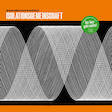 Quick advice for any punk and punk-adjacent bands looking to get a record out today – go send your demo to Phantom! I’m not sure how this German label does it, but they seem to churn out a higher frequency of vinyl releases than anyone else out there… maybe their dad owns a pressing plant? Anyway, Isolationsgemeinschaft (or as they’re casually known, I.G.) linked up with the label for their second full-length, and much like their 2020 debut, Der Tanz Geht Weiter! is a morose synth-wave album full of deadpan German vocals, oscillating synths and unfriendly drum machines. Cabaret Voltaire and Martial Canterel feel like compatriots if not outright influences, though Isolationsgemeinschaft are a bit less experimental than the former and less clinical than the latter. The immediate delivery and somewhat rudimentary songwriting feels more post-punk than cold-wave, even if there is nary a guitar in sight. They probably open for Boy Harsher when they come through Germany, or if they don’t, Boy Harsher’s agent needs to pay better attention to the underground. By no means a life-changing album, but would I lurk around a basement chamber wearing black eyeliner and a cape while listening to it? I believe I would.
Quick advice for any punk and punk-adjacent bands looking to get a record out today – go send your demo to Phantom! I’m not sure how this German label does it, but they seem to churn out a higher frequency of vinyl releases than anyone else out there… maybe their dad owns a pressing plant? Anyway, Isolationsgemeinschaft (or as they’re casually known, I.G.) linked up with the label for their second full-length, and much like their 2020 debut, Der Tanz Geht Weiter! is a morose synth-wave album full of deadpan German vocals, oscillating synths and unfriendly drum machines. Cabaret Voltaire and Martial Canterel feel like compatriots if not outright influences, though Isolationsgemeinschaft are a bit less experimental than the former and less clinical than the latter. The immediate delivery and somewhat rudimentary songwriting feels more post-punk than cold-wave, even if there is nary a guitar in sight. They probably open for Boy Harsher when they come through Germany, or if they don’t, Boy Harsher’s agent needs to pay better attention to the underground. By no means a life-changing album, but would I lurk around a basement chamber wearing black eyeliner and a cape while listening to it? I believe I would.
Ben Klock & Fadi Mohem Klockworks 34 12″ (Klockworks)
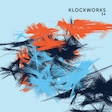 If it ever feels like I write overwhelmingly positive words about the techno I review here, I think it’s because I don’t get sent a ton of this stuff, so I’m already kind of self-selecting, going right to the records that interest me most and passing over some of the less-inspired entries (in what is of course a supremely crowded field of artists and producers). This means I have more time to check out a new Ben Klock EP such as this, love it, and share the good word here with you. The last time Ben Klock teamed up with Fadi Mohem, it was for “a collaboration on a futuristic NFT in 2021” (insert queasy-face emoji), but I’m glad they’re back to taking their hardware jams to vinyl instead of wherever NFTs reside. Opener “Prefix” could entertain me from its opening drum loop alone, a ragged stutter-step that pleasantly increases my heart rate. They let that killer loop rip and proceed to craft a full tune around it, with lingering keys, EKG beeps and a pleasantly restless energy. The rest of the cuts continue similarly – don’t expect any epic build-ups or melodic leads, Klock and Mohem are here to drill a hole in your head with their mighty selection of hardware, very reminiscent of Planetary Assault Systems, Barker & Baumecker and the rest of Ostgut Ton’s heavyweight fighters. If the extremely German bleep/thwack of “Hydrocarbon” doesn’t resonate with you, I implore you to send me some techno that does!
If it ever feels like I write overwhelmingly positive words about the techno I review here, I think it’s because I don’t get sent a ton of this stuff, so I’m already kind of self-selecting, going right to the records that interest me most and passing over some of the less-inspired entries (in what is of course a supremely crowded field of artists and producers). This means I have more time to check out a new Ben Klock EP such as this, love it, and share the good word here with you. The last time Ben Klock teamed up with Fadi Mohem, it was for “a collaboration on a futuristic NFT in 2021” (insert queasy-face emoji), but I’m glad they’re back to taking their hardware jams to vinyl instead of wherever NFTs reside. Opener “Prefix” could entertain me from its opening drum loop alone, a ragged stutter-step that pleasantly increases my heart rate. They let that killer loop rip and proceed to craft a full tune around it, with lingering keys, EKG beeps and a pleasantly restless energy. The rest of the cuts continue similarly – don’t expect any epic build-ups or melodic leads, Klock and Mohem are here to drill a hole in your head with their mighty selection of hardware, very reminiscent of Planetary Assault Systems, Barker & Baumecker and the rest of Ostgut Ton’s heavyweight fighters. If the extremely German bleep/thwack of “Hydrocarbon” doesn’t resonate with you, I implore you to send me some techno that does!
Lolina Fast Fashion LP (Deathbomb Arc)
 “Lolina is the Joseph Beuys of my generation” is a thought I had while listening to her newest, the head-spinning Fast Fashion, and while I don’t have a well thought-out explanation to defend my hasty assertion just yet, I can confirm that she’s dazzled and befuddled me over the past few years like no one else. What to even say about this one? I’d rather you heard it yourself, but until you do, I’ll start by kinda uselessly stating that the a-side encompassing cut “Looking For A Charger But Only Works On Batteries” is wild. She seems to be messing with some sort of time-squelching sampler for the length of the album, a Casio SK-1 modified to edit space-time as well as sample one’s voice, perhaps? The first cut is nearly twenty minutes long, and Lolina works it the hell out, even dropping a beat ala MF Doom for a brief head-bob excursion. In lesser hands, I’d struggle to get through such a frantic mess, but the track progresses with finesse and horror, a real marker of our times. The b-side is filled with a fairly consistent level of sampler madness, perhaps perfected on “”Mark Ronson’s Ted Talk Intro (Using Computer Remix)”, a track with a title that lets you know what’s in store. Now, I’m not going to Google it to figure out if Mark Ronson actually ever gave a real TED Talk, but Lolina chops his words of motivation with a Dada-ist impulse, whipping it into footwork-style loops seemingly on the fly. All of Fast Fashion feels immediate and unedited, though I accept that I’ll never know what truly took place to create these baffling rapid-fire edits. With some artists, you want to know how the sausage is made, but I accept Lolina’s world on her terms and conditions, too busy being delighted and stunned to react any other way.
“Lolina is the Joseph Beuys of my generation” is a thought I had while listening to her newest, the head-spinning Fast Fashion, and while I don’t have a well thought-out explanation to defend my hasty assertion just yet, I can confirm that she’s dazzled and befuddled me over the past few years like no one else. What to even say about this one? I’d rather you heard it yourself, but until you do, I’ll start by kinda uselessly stating that the a-side encompassing cut “Looking For A Charger But Only Works On Batteries” is wild. She seems to be messing with some sort of time-squelching sampler for the length of the album, a Casio SK-1 modified to edit space-time as well as sample one’s voice, perhaps? The first cut is nearly twenty minutes long, and Lolina works it the hell out, even dropping a beat ala MF Doom for a brief head-bob excursion. In lesser hands, I’d struggle to get through such a frantic mess, but the track progresses with finesse and horror, a real marker of our times. The b-side is filled with a fairly consistent level of sampler madness, perhaps perfected on “”Mark Ronson’s Ted Talk Intro (Using Computer Remix)”, a track with a title that lets you know what’s in store. Now, I’m not going to Google it to figure out if Mark Ronson actually ever gave a real TED Talk, but Lolina chops his words of motivation with a Dada-ist impulse, whipping it into footwork-style loops seemingly on the fly. All of Fast Fashion feels immediate and unedited, though I accept that I’ll never know what truly took place to create these baffling rapid-fire edits. With some artists, you want to know how the sausage is made, but I accept Lolina’s world on her terms and conditions, too busy being delighted and stunned to react any other way.
Frank Marchi Jazz Odyssey LP (no label)
 Trying to pick up enough of my brain matter off the floor to see if I can string a few words together about the record that splattered it there in the first place, Frank Marchi’s Jazz Odyssey. Marchi is a living West Bay legend, having played in bands as crucial as Plutocracy and Agents Of Satan while remaining active beyond their legacies (he even played bass on the new Tony Molina record!). And now he’s got his first solo record, what seems to be a dub plate full of solo material recorded earlier this year. It rules! I’m going to go ahead and assume that Marchi personally formulated a lot of what I’ve come to understand as the West Bay sound (while also being influenced by his countless friends and bandmates), as the material here is vibrant and alive with that distinctively West Bay form of smoothed-out aggression. It’s music for cruising down a highway with a giant joint being passed around, but also way more hostile and mystifying than the various other forms of music that enable the same behavior. I can certainly hear No Le$$ in these sour grooves, but I can also hear the beat-digging of Madlib, the cosmic riff meditation of Om and the hardcore-prog of Man Is The Bastard and Gasp. These songs are all instrumental, but unlikely and entertaining samples provide the occasional human voice, and Marchi’s freaky guitar noodling contrasts nicely with the funky breaks and dynamic bass grooves. It’s crazy to me that I can find zero information about this record online, only some clips on Soundcloud, considering the level of craftsmanship and quality. I kinda keep worrying I dreamed this whole thing up, that I’m going to look for it next to my stereo the following morning and it’ll be gone.
Trying to pick up enough of my brain matter off the floor to see if I can string a few words together about the record that splattered it there in the first place, Frank Marchi’s Jazz Odyssey. Marchi is a living West Bay legend, having played in bands as crucial as Plutocracy and Agents Of Satan while remaining active beyond their legacies (he even played bass on the new Tony Molina record!). And now he’s got his first solo record, what seems to be a dub plate full of solo material recorded earlier this year. It rules! I’m going to go ahead and assume that Marchi personally formulated a lot of what I’ve come to understand as the West Bay sound (while also being influenced by his countless friends and bandmates), as the material here is vibrant and alive with that distinctively West Bay form of smoothed-out aggression. It’s music for cruising down a highway with a giant joint being passed around, but also way more hostile and mystifying than the various other forms of music that enable the same behavior. I can certainly hear No Le$$ in these sour grooves, but I can also hear the beat-digging of Madlib, the cosmic riff meditation of Om and the hardcore-prog of Man Is The Bastard and Gasp. These songs are all instrumental, but unlikely and entertaining samples provide the occasional human voice, and Marchi’s freaky guitar noodling contrasts nicely with the funky breaks and dynamic bass grooves. It’s crazy to me that I can find zero information about this record online, only some clips on Soundcloud, considering the level of craftsmanship and quality. I kinda keep worrying I dreamed this whole thing up, that I’m going to look for it next to my stereo the following morning and it’ll be gone.
Dan Melchior CB Odyssey LP (Sophomore Lounge / Feeding Tube)
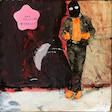 Dan Melchior is a man of many talents – just check out his paintings on Instagram! – and even narrowing it down to merely his musical output results in a fairly vast selection. I’ve particularly enjoyed some of his more abstract and noisy releases, but CB Odyssey seems to be lyrically driven and is all the most entertaining because of it. Maybe he was always a fine-tuned wordsmith and I’d forgotten or somehow not really noticed, but CB Odyssey is full of lyrical gems, Melchior allowing the listeners to witness the futile insanity of the world through his keenly observant eyes. I think it’s the third track that features the couplet “the dog shat on a dead jellyfish / I suppose I should’ve made a wish” – it’s a line that perked my ears up immediately, and Melchior casually wanders through his songs with eloquence and hilarity throughout. The music never gets in the way of his words; most of these songs follow somewhat familiar melodic progressions with fidelity both crusty and glammy, vaguely similar to Timmy’s Organism and Debris but also kinda bluesy and welcoming, no noise for noise’s sake. The form might be conventional, but Melchior’s animated personality and unique perspective whip it up into something unfamiliar and captivating.
Dan Melchior is a man of many talents – just check out his paintings on Instagram! – and even narrowing it down to merely his musical output results in a fairly vast selection. I’ve particularly enjoyed some of his more abstract and noisy releases, but CB Odyssey seems to be lyrically driven and is all the most entertaining because of it. Maybe he was always a fine-tuned wordsmith and I’d forgotten or somehow not really noticed, but CB Odyssey is full of lyrical gems, Melchior allowing the listeners to witness the futile insanity of the world through his keenly observant eyes. I think it’s the third track that features the couplet “the dog shat on a dead jellyfish / I suppose I should’ve made a wish” – it’s a line that perked my ears up immediately, and Melchior casually wanders through his songs with eloquence and hilarity throughout. The music never gets in the way of his words; most of these songs follow somewhat familiar melodic progressions with fidelity both crusty and glammy, vaguely similar to Timmy’s Organism and Debris but also kinda bluesy and welcoming, no noise for noise’s sake. The form might be conventional, but Melchior’s animated personality and unique perspective whip it up into something unfamiliar and captivating.
Михаил Минерал Лоб LP (Inu Wan Wan)
 Feels like the previous Inu Wan Wan album (the improvised klang of Sheng Jie and BoYu Deng) is still ringing in my ears, and now I’m trying to make sense of this outrageous debut from Moscow’s Михаил Минерал (translated to Mikhail Mineral for us non-Cyrillic readers/typers). Opening with the kitchen-table clatter of “Infa”, I could tell this would be the sort of record I dig, a dazzling display of junk-drawer percussion that reveals its form after a couple minutes. I could go for a whole record of this specific style, little bits of tuned metal and wooden scraps getting shuffled around, but Mineral’s instrumentation expands throughout Лоб like one of those death-smelling flowers with giant otherworldly petals. These tracks are clearly the work of a highly curious mind, with details whizzing past at such a clip that it’ll take multiple listens to catch all the details. Throughout, I’m picking up a clear and direct lineage to the late great Ghédalia Tazartès, the way in which Mineral borrows from folk-song, hysterical Dadaism, jazz and DIY synth-forms to pull together their own vision of noise. “Burn Pavin” might be one of the most traditionally musical tracks here, and it’s also one of my favorites, a heavily messed-with horn given an extended solo over a persistent pulse and vocal chant. Лоб is absolutely teeming with life, both beautiful and repugnant. Recommended!
Feels like the previous Inu Wan Wan album (the improvised klang of Sheng Jie and BoYu Deng) is still ringing in my ears, and now I’m trying to make sense of this outrageous debut from Moscow’s Михаил Минерал (translated to Mikhail Mineral for us non-Cyrillic readers/typers). Opening with the kitchen-table clatter of “Infa”, I could tell this would be the sort of record I dig, a dazzling display of junk-drawer percussion that reveals its form after a couple minutes. I could go for a whole record of this specific style, little bits of tuned metal and wooden scraps getting shuffled around, but Mineral’s instrumentation expands throughout Лоб like one of those death-smelling flowers with giant otherworldly petals. These tracks are clearly the work of a highly curious mind, with details whizzing past at such a clip that it’ll take multiple listens to catch all the details. Throughout, I’m picking up a clear and direct lineage to the late great Ghédalia Tazartès, the way in which Mineral borrows from folk-song, hysterical Dadaism, jazz and DIY synth-forms to pull together their own vision of noise. “Burn Pavin” might be one of the most traditionally musical tracks here, and it’s also one of my favorites, a heavily messed-with horn given an extended solo over a persistent pulse and vocal chant. Лоб is absolutely teeming with life, both beautiful and repugnant. Recommended!
Мodal Melodies Modal Melodies LP (Anti Fade)
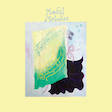 The restlessly creative Jake Robertson is seemingly unsatisfied with the thick stack of records he’s recently released under the Alien Nose Job moniker, now collaborating with vocalist Violetta Del Conte-Race in the form of Modal Melodies. Sure, he could’ve thrown us a curveball and had this band sound like Atari Teenage Riot, The Cult or ESG, but Robertson followed his synthetic heart for an album of lightweight synthesized pop the way he’s done it in the past. Modal Melodies cite Lena Platonos and Karen Marks as influences, two artists I rank highly, but I’m not sure Modal Melodies ever reaches the level of artistry, catchiness and overall weirdness of those artists. Instead, it finds a fairly inoffensive lane, mid-paced and melodic, closer to Jane Weaver, Kristin Kontrol, Ann Steel or Austra, to be filed under the general header of “indie goes electronic”. The sounds are nice, and some of these songs (like “The Sun”) have some cool stuff happening under the hood, but they’re delivered so passively, with Del Conte-Race’s vocals low in the mix and reverbed to the point where they become another melodic aspect rather than a commanding focus. I feel like lots of bands do this, they sort of coat everything in a hazy warmth, and while it can make the music more comfortable to pleasantly tune out, I’m the kind of listener who wants to either know what’s going on or be taken on a fantasy ride; this one doesn’t really do either for me.
The restlessly creative Jake Robertson is seemingly unsatisfied with the thick stack of records he’s recently released under the Alien Nose Job moniker, now collaborating with vocalist Violetta Del Conte-Race in the form of Modal Melodies. Sure, he could’ve thrown us a curveball and had this band sound like Atari Teenage Riot, The Cult or ESG, but Robertson followed his synthetic heart for an album of lightweight synthesized pop the way he’s done it in the past. Modal Melodies cite Lena Platonos and Karen Marks as influences, two artists I rank highly, but I’m not sure Modal Melodies ever reaches the level of artistry, catchiness and overall weirdness of those artists. Instead, it finds a fairly inoffensive lane, mid-paced and melodic, closer to Jane Weaver, Kristin Kontrol, Ann Steel or Austra, to be filed under the general header of “indie goes electronic”. The sounds are nice, and some of these songs (like “The Sun”) have some cool stuff happening under the hood, but they’re delivered so passively, with Del Conte-Race’s vocals low in the mix and reverbed to the point where they become another melodic aspect rather than a commanding focus. I feel like lots of bands do this, they sort of coat everything in a hazy warmth, and while it can make the music more comfortable to pleasantly tune out, I’m the kind of listener who wants to either know what’s going on or be taken on a fantasy ride; this one doesn’t really do either for me.
Tony Molina In The Fade LP (Run For Cover / Summer Shade)
 The only people I know who don’t like Tony Molina’s music are the ones who haven’t heard it yet. The man has been clearly and poignantly crafting his guitar pop for a good number of years now, kind of breaking out with 2013’s Dissed And Dismissed (has it really been nine years??) and continuing to forge his own path of wistful guitar pop with baroque melodies and thrillingly brief guitar solos. 2018’s Kill The Lights kind of swerved us with its blatantly Beatles-inspired acoustic pop, and now In The Fade kind of captures the full Molina spectrum, from tender instrumental strum to massive fuzz-pop hits. His sound has been compared to Weezer more than a few times, but it hit me while listening to In The Fade that the correct comparison is actually The Rentals – Molina shares Matt Sharp’s uncompromising pop vision, similar in both vocal delivery and impatience for the big chorus. Sharp fell in love with synths, but Molina is a guitar man through and through, and would also probably quit Weezer after a couple landmark albums for being unable to deal with the annoying main guy. Molina doesn’t need to hitch his wagon to a big star anyway, since his own glorious vision of guitar-pop is on full display here through what is his lengthiest album yet. It’s his longest and I’m already eager for more!
The only people I know who don’t like Tony Molina’s music are the ones who haven’t heard it yet. The man has been clearly and poignantly crafting his guitar pop for a good number of years now, kind of breaking out with 2013’s Dissed And Dismissed (has it really been nine years??) and continuing to forge his own path of wistful guitar pop with baroque melodies and thrillingly brief guitar solos. 2018’s Kill The Lights kind of swerved us with its blatantly Beatles-inspired acoustic pop, and now In The Fade kind of captures the full Molina spectrum, from tender instrumental strum to massive fuzz-pop hits. His sound has been compared to Weezer more than a few times, but it hit me while listening to In The Fade that the correct comparison is actually The Rentals – Molina shares Matt Sharp’s uncompromising pop vision, similar in both vocal delivery and impatience for the big chorus. Sharp fell in love with synths, but Molina is a guitar man through and through, and would also probably quit Weezer after a couple landmark albums for being unable to deal with the annoying main guy. Molina doesn’t need to hitch his wagon to a big star anyway, since his own glorious vision of guitar-pop is on full display here through what is his lengthiest album yet. It’s his longest and I’m already eager for more!
Мontel Palmer Wayback 7″ flexi (Tax Free)
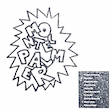 The Tax Free folks continue to expand and dazzle my mind with this new single-sided flexi-disc from Montel Palmer, an apparent band (as opposed to a single person) with social ties to other Tax Free artists like Iris and Employee, both of whom I cherish. While those other artists follow a discernible albeit rocky path toward some form of pop, Montel Palmer fell off that cart long before it even started rolling. Their music consists of rough tape experiments, warbly guitar excursions and unrelated rhythmic accompaniment, all of which appear to be significantly jacked-up before making it to the mix. Reminds me of head-scratching DIY offerings by the mysterious File Under Pop, Milk From Cheltenham, Chips For The Poor and The Shadow Ring, with a smidge of the basement-techno-psych mindset I’d associate with Wah Wah Wino’s more esoteric offerings. Jump right to the impossibly catchy numbskullery of “Who’s Gonna Get It???” and see if Wayback isn’t the finest flexi-disc you willingly purchase for yourself in 2022.
The Tax Free folks continue to expand and dazzle my mind with this new single-sided flexi-disc from Montel Palmer, an apparent band (as opposed to a single person) with social ties to other Tax Free artists like Iris and Employee, both of whom I cherish. While those other artists follow a discernible albeit rocky path toward some form of pop, Montel Palmer fell off that cart long before it even started rolling. Their music consists of rough tape experiments, warbly guitar excursions and unrelated rhythmic accompaniment, all of which appear to be significantly jacked-up before making it to the mix. Reminds me of head-scratching DIY offerings by the mysterious File Under Pop, Milk From Cheltenham, Chips For The Poor and The Shadow Ring, with a smidge of the basement-techno-psych mindset I’d associate with Wah Wah Wino’s more esoteric offerings. Jump right to the impossibly catchy numbskullery of “Who’s Gonna Get It???” and see if Wayback isn’t the finest flexi-disc you willingly purchase for yourself in 2022.
Organ Of Corti Incus / Malleus 7″ (Dead Mind)
 Dan Johansson has yet to offer a collaboration I haven’t enjoyed, this new one with iDEAL’s Joachim Nordwall and Altar Of Flies’ Mattias Gustafsson included. Johansson’s work in Neutral is my fave, but I’ve always enjoyed his solo material as Sewer Election, and now you can add Organ Of Corti to the ever-growing stack. I appreciate that many Swedes still utilize seven-inches as a meaningful format, and these two cuts are fun ventures into places that’ll permanently stain your clothes. The central rhythm to “Incus” is a wet sloshing sound, over which they lay digi-metallic interference, cut-up noise and electro-acoustic disturbances. It calls to mind John Wiese interrupting an Aaron Dilloway solo loop session with his chaotic range of fast-moving electrical shocks, which, come to think of it, probably already happened at some point in time. “Malleus” also brings forth a late ’00s Wolf Eyes style, with frantic industrial puttering placed up against eerie synth warbles, slowly gaining in intensity as drawers of rusty utensils rattle and the three noise-makers move from a passive conversation between their respective “instruments” into a lively three-way sparring. Even at the EP’s most frantic moments, these pros leave plenty of space for the sounds to breathe, embracing cooperation over competition. It’s scarier, and more fun, that way.
Dan Johansson has yet to offer a collaboration I haven’t enjoyed, this new one with iDEAL’s Joachim Nordwall and Altar Of Flies’ Mattias Gustafsson included. Johansson’s work in Neutral is my fave, but I’ve always enjoyed his solo material as Sewer Election, and now you can add Organ Of Corti to the ever-growing stack. I appreciate that many Swedes still utilize seven-inches as a meaningful format, and these two cuts are fun ventures into places that’ll permanently stain your clothes. The central rhythm to “Incus” is a wet sloshing sound, over which they lay digi-metallic interference, cut-up noise and electro-acoustic disturbances. It calls to mind John Wiese interrupting an Aaron Dilloway solo loop session with his chaotic range of fast-moving electrical shocks, which, come to think of it, probably already happened at some point in time. “Malleus” also brings forth a late ’00s Wolf Eyes style, with frantic industrial puttering placed up against eerie synth warbles, slowly gaining in intensity as drawers of rusty utensils rattle and the three noise-makers move from a passive conversation between their respective “instruments” into a lively three-way sparring. Even at the EP’s most frantic moments, these pros leave plenty of space for the sounds to breathe, embracing cooperation over competition. It’s scarier, and more fun, that way.
Persona Free Your Mind! 12″ (Iron Lung)
 Hasn’t been a shortage of New York hardcore in decades now, and I’m not even including the ever-popular gangsta-beatdown style when I say that. Persona must be kinda new, but they’ll fit right in with all the crusty, dressed-up punks who bring a handful of fireworks to every gig. These songs are chaotic and raging in that distinct vein of American-influenced Japanese-influenced American hardcore. I’m hearing plenty of H-100s and Nine Shocks Terror here, fast but never grindy with shifty riffs and drumming that has no choice but to pummel. The vocals appear to be studio-distorted, which places them in more of a modern lineage than an actual 1999 hardcore-punk band, but there’s no mistaking Persona for Blazing Eye, S.H.I.T. or Lebenden Toten – they don’t seem particularly interested in “hardcore as noise” so much as “hardcore as a means for destroying the system (or at least someone else’s property)”. Cool with me! There’s more value than ever in hardcore music that speaks to a wide audience in both riff and lyric, as opposed to having to guess which $1,200 Swedish hardcore seven-inch inspired which song, and Persona make it work, even while living in the most expensive city in America.
Hasn’t been a shortage of New York hardcore in decades now, and I’m not even including the ever-popular gangsta-beatdown style when I say that. Persona must be kinda new, but they’ll fit right in with all the crusty, dressed-up punks who bring a handful of fireworks to every gig. These songs are chaotic and raging in that distinct vein of American-influenced Japanese-influenced American hardcore. I’m hearing plenty of H-100s and Nine Shocks Terror here, fast but never grindy with shifty riffs and drumming that has no choice but to pummel. The vocals appear to be studio-distorted, which places them in more of a modern lineage than an actual 1999 hardcore-punk band, but there’s no mistaking Persona for Blazing Eye, S.H.I.T. or Lebenden Toten – they don’t seem particularly interested in “hardcore as noise” so much as “hardcore as a means for destroying the system (or at least someone else’s property)”. Cool with me! There’s more value than ever in hardcore music that speaks to a wide audience in both riff and lyric, as opposed to having to guess which $1,200 Swedish hardcore seven-inch inspired which song, and Persona make it work, even while living in the most expensive city in America.
Personal Style False Memories 7″ (no label)
 I wouldn’t be surprised if there are more rock bands in Buffalo and Albany than the five boroughs of New York City at the present moment. Not sure what’s going on up there – haven’t they heard of home-recorded chill-wave yet? – but it’s cool to see such activity in an area that’s never really snagged the spotlight. Anyway, Personal Style are one of these bands, and they’ve got this new two-song single, which rocks in kind of a “polished ’90s alt-rock meets firehall punk shows” way. “False Memories” lands on the smoother side of the intersection of radio rock and post-punk emo, a simplistic stomp which has been utilized in a similar fashion by bands like Foo Fighters and The Hives to crowd-pumping success. “Heartbeat Memorial” is poppier and faster, like The Get-Up Kids covering Queens Of The Stone Age perhaps? The bassist wrings a lot of joy out of what would be a fairly rudimentary riff in someone else’s hands, and the singer manages to slightly strain without losing tone, reminding me of The Jazz June’s Andrew Low (whose last album remains criminally under-appreciated). Ironically, there isn’t a ton of personal style on display here, but that’s kinda what makes me enjoy the seven-inch; Personal Style aren’t trying to do something unprecedented or abnormal, they just wanna play their poppy emo-punk to the best of their abilities and I commend them for it.
I wouldn’t be surprised if there are more rock bands in Buffalo and Albany than the five boroughs of New York City at the present moment. Not sure what’s going on up there – haven’t they heard of home-recorded chill-wave yet? – but it’s cool to see such activity in an area that’s never really snagged the spotlight. Anyway, Personal Style are one of these bands, and they’ve got this new two-song single, which rocks in kind of a “polished ’90s alt-rock meets firehall punk shows” way. “False Memories” lands on the smoother side of the intersection of radio rock and post-punk emo, a simplistic stomp which has been utilized in a similar fashion by bands like Foo Fighters and The Hives to crowd-pumping success. “Heartbeat Memorial” is poppier and faster, like The Get-Up Kids covering Queens Of The Stone Age perhaps? The bassist wrings a lot of joy out of what would be a fairly rudimentary riff in someone else’s hands, and the singer manages to slightly strain without losing tone, reminding me of The Jazz June’s Andrew Low (whose last album remains criminally under-appreciated). Ironically, there isn’t a ton of personal style on display here, but that’s kinda what makes me enjoy the seven-inch; Personal Style aren’t trying to do something unprecedented or abnormal, they just wanna play their poppy emo-punk to the best of their abilities and I commend them for it.
Shackleton The Majestic Yes 12″ (Honest Jon’s)
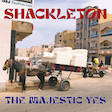 I’ve been patiently waiting for this one, a Shackleton record where he returns from the mathematical occult outer-realm he’s floated off into over the past few years and gets back to the stuff I love the most – mildly creepy tribal-drum madness. This one features no guests, no outside influences, just the man himself and his ability to whip up a heady mix of rich percussive workouts and dark cosmic exploration. While clearly bearing his sonic signature, the three originals here are a bit more direct and live-sounding than previous material, solidly outside of the traditional club realm while deeply rhythmic in nature. Shackleton uses a very natural-sounding set of percussive motifs here, with the sounds of stretched rawhide, tuned wood blocks and caustic cymbals taking precedence over anything blatantly synthetic. While the drums lend themselves to repetition, these tracks are far from monotonous commutes; patterns shift, juke and split in two, or in the case of “The Overwhelming Yes”, speed up and overheat about halfway through. Wrapped with a Mark Ernestus dub of “The Overwhelming Yes”, The Majestic Yes is a fine return-to-form for one of Great Britain’s most remarkable producers of the ’00s, ’10s and beyond.
I’ve been patiently waiting for this one, a Shackleton record where he returns from the mathematical occult outer-realm he’s floated off into over the past few years and gets back to the stuff I love the most – mildly creepy tribal-drum madness. This one features no guests, no outside influences, just the man himself and his ability to whip up a heady mix of rich percussive workouts and dark cosmic exploration. While clearly bearing his sonic signature, the three originals here are a bit more direct and live-sounding than previous material, solidly outside of the traditional club realm while deeply rhythmic in nature. Shackleton uses a very natural-sounding set of percussive motifs here, with the sounds of stretched rawhide, tuned wood blocks and caustic cymbals taking precedence over anything blatantly synthetic. While the drums lend themselves to repetition, these tracks are far from monotonous commutes; patterns shift, juke and split in two, or in the case of “The Overwhelming Yes”, speed up and overheat about halfway through. Wrapped with a Mark Ernestus dub of “The Overwhelming Yes”, The Majestic Yes is a fine return-to-form for one of Great Britain’s most remarkable producers of the ’00s, ’10s and beyond.
Short Cuts! Find Us / Seeds Of Doubt 7″ (OBS)
 Is it just old dudes reliving their teenage years who are releasing seven-inches anymore? I sure hope not, but there seems to be a good amount of guys my age or older putting out these financially-irresponsible EPs because they’re the only ones with the fiscal means to do it in our current inequitable hellscape. Anyway, I can’t quite figure out where Short Cuts! are from, but I’m narrowing it down to Southern California by way of London, England. At least that’s how they sound, as they inexplicably cop the trademark Fat Wreck Chords sound on these two tracks with vocals that are some strain of British (or perhaps merely trying to be). “Find Us” is like Lagwagon with the sing-along resonance of Good Riddance, a phrase I didn’t expect to share here in 2022, but I’m truly not mad at it, particularly after spinning “Seeds Of Doubt” on the b-side, which confirms this as their sound. The b-side’s not quite as fast, but it calls to mind my early teenage years, encountering pop-punk bands from the Poconos doing their best impressions of Anti-Flag, NOFX and Bad Religion at the show while wondering if anyone will enjoy my wannabe power-violence band’s demo tape. I deeply appreciate Short Cuts! for surprising me with these nostalgic feelings, and I hope they’re able to find a similar sense of satisfaction in what they’re doing.
Is it just old dudes reliving their teenage years who are releasing seven-inches anymore? I sure hope not, but there seems to be a good amount of guys my age or older putting out these financially-irresponsible EPs because they’re the only ones with the fiscal means to do it in our current inequitable hellscape. Anyway, I can’t quite figure out where Short Cuts! are from, but I’m narrowing it down to Southern California by way of London, England. At least that’s how they sound, as they inexplicably cop the trademark Fat Wreck Chords sound on these two tracks with vocals that are some strain of British (or perhaps merely trying to be). “Find Us” is like Lagwagon with the sing-along resonance of Good Riddance, a phrase I didn’t expect to share here in 2022, but I’m truly not mad at it, particularly after spinning “Seeds Of Doubt” on the b-side, which confirms this as their sound. The b-side’s not quite as fast, but it calls to mind my early teenage years, encountering pop-punk bands from the Poconos doing their best impressions of Anti-Flag, NOFX and Bad Religion at the show while wondering if anyone will enjoy my wannabe power-violence band’s demo tape. I deeply appreciate Short Cuts! for surprising me with these nostalgic feelings, and I hope they’re able to find a similar sense of satisfaction in what they’re doing.
Troth Blood In My Hair / Lumena I 7″ (I Dischi Del Barone)
 Been a minute since I had heard from the great I Dischi Del Barone label (the Goodbye Boozy of the post-noise underground!), but don’t pour one out for ’em just yet – the singles-based label dropped two new ones in 2022, one of them being this Troth offering. Here’s a group that continues to find their path with each new record, moving from a more nondescript position into its own form of weirdly crunchy chill-wave, like a soft blanket speckled with dried leaves from yesterday’s picnic. “Blood In My Hair” pushes the electronic rhythm right up in your face, a wet smack that’s almost incongruent with the hushed melodic tones and Elizabeth Fraser-esque vocals (near impossible to follow, even with the lyric sheet!). Troth make it work! “Lumena” starts off sounding like a King Diamond interlude with its spooky harpsichord progression, but then Amelia Besseny’s vocals hit and the thing switches to mid-’80s 4AD mode, a pensive gothic pre-game suited for brewing some rose-hip tea and applying one’s eyeliner before going to the Lords Of Acid gig much later in the evening. Long may the Swedes and Australians cooperate on ventures such as this!
Been a minute since I had heard from the great I Dischi Del Barone label (the Goodbye Boozy of the post-noise underground!), but don’t pour one out for ’em just yet – the singles-based label dropped two new ones in 2022, one of them being this Troth offering. Here’s a group that continues to find their path with each new record, moving from a more nondescript position into its own form of weirdly crunchy chill-wave, like a soft blanket speckled with dried leaves from yesterday’s picnic. “Blood In My Hair” pushes the electronic rhythm right up in your face, a wet smack that’s almost incongruent with the hushed melodic tones and Elizabeth Fraser-esque vocals (near impossible to follow, even with the lyric sheet!). Troth make it work! “Lumena” starts off sounding like a King Diamond interlude with its spooky harpsichord progression, but then Amelia Besseny’s vocals hit and the thing switches to mid-’80s 4AD mode, a pensive gothic pre-game suited for brewing some rose-hip tea and applying one’s eyeliner before going to the Lords Of Acid gig much later in the evening. Long may the Swedes and Australians cooperate on ventures such as this!
Tsap Crimes Against Time LP (Altered States Tapes)
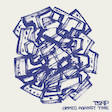 Tsap is the duo of Cooper Bowman (Troth) and Chris Colla (Low Life), and they’ve crawled out of the murk of their debut LP, Flickering Lyghte In Campsite, without cleaning themselves up for Crimes Against Time. Whereas the first one had a loose industrial-techno feel at times, Crimes moves its cloudy synths in a different direction. Essentially all of these songs feature lightweight drum-machine patterns and what seems to be the tiniest synth on the table, its high-pitched melodies sounding as though they’re one AA battery away from cutting out. Imagine a Suicide that runs on Diet Coke instead of, umm, actual coke, and replace the “Elvis impersonator trapped in a well” vocals of Alan Vega with a distorted industrial yowl redolent of Michael Berdan (with a subtle Australian accent). Or imagine the fragile moodiness of Trop Tard disturbed by a belligerent punter on the bus. It’s an interesting combo, these unimposing synths/rhythms and the angry shouts of a man choking on his own smoke in the other end of the basement. Took me a couple listens to really settle in, but I’d say I “get it” at this point, and also quite enjoy it, even when the synthetic bass lines recall the intentional chintziness of Sleaford Mods. If anything, Tsap feels like some act that would’ve appeared on a single Broken Flag compilation cassette before immediately vanishing forever… what’s not to like about that?
Tsap is the duo of Cooper Bowman (Troth) and Chris Colla (Low Life), and they’ve crawled out of the murk of their debut LP, Flickering Lyghte In Campsite, without cleaning themselves up for Crimes Against Time. Whereas the first one had a loose industrial-techno feel at times, Crimes moves its cloudy synths in a different direction. Essentially all of these songs feature lightweight drum-machine patterns and what seems to be the tiniest synth on the table, its high-pitched melodies sounding as though they’re one AA battery away from cutting out. Imagine a Suicide that runs on Diet Coke instead of, umm, actual coke, and replace the “Elvis impersonator trapped in a well” vocals of Alan Vega with a distorted industrial yowl redolent of Michael Berdan (with a subtle Australian accent). Or imagine the fragile moodiness of Trop Tard disturbed by a belligerent punter on the bus. It’s an interesting combo, these unimposing synths/rhythms and the angry shouts of a man choking on his own smoke in the other end of the basement. Took me a couple listens to really settle in, but I’d say I “get it” at this point, and also quite enjoy it, even when the synthetic bass lines recall the intentional chintziness of Sleaford Mods. If anything, Tsap feels like some act that would’ve appeared on a single Broken Flag compilation cassette before immediately vanishing forever… what’s not to like about that?
Vintage Crop Kibitzer LP (Anti Fade)
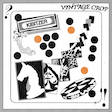 Fourth album from Melbourne’s Vintage Crop, who, despite their spicy name, revel in the mind-numbery of domestic life, not BDSM gear. They also have managed to not really change their sound all that much, as Kibitzer is a very reasonable and congruous follow-up to 2020’s Serve To Serve Again. If you’re a stranger to the Vintage Crop experience, they’re like if one of those mandatory corporate human resources training videos was a post-punk band, but in a good way, since they’re not actually a part of your terrible office-cubicle job. Sounds odd, but it works! If anything, they’ve toned down the “-punk” aspect of their sound here for a more polite and manageable indie sorta thing, like a pre-funky Parquet Courts, a less-manic Uranium Club or, at their friendliest, The Shifters. It’s not until b-side “Drafted” comes on that I can picture their crowd bopping into each other, but I’m not mad about it – Vintage Crop seem to deliver their message best when their songs are melodic and relaxed, which tends to be the dominant mode here. Why rush screaming into the modern dystopia when we can calmly take the elevator, humming a little melody to ourselves?
Fourth album from Melbourne’s Vintage Crop, who, despite their spicy name, revel in the mind-numbery of domestic life, not BDSM gear. They also have managed to not really change their sound all that much, as Kibitzer is a very reasonable and congruous follow-up to 2020’s Serve To Serve Again. If you’re a stranger to the Vintage Crop experience, they’re like if one of those mandatory corporate human resources training videos was a post-punk band, but in a good way, since they’re not actually a part of your terrible office-cubicle job. Sounds odd, but it works! If anything, they’ve toned down the “-punk” aspect of their sound here for a more polite and manageable indie sorta thing, like a pre-funky Parquet Courts, a less-manic Uranium Club or, at their friendliest, The Shifters. It’s not until b-side “Drafted” comes on that I can picture their crowd bopping into each other, but I’m not mad about it – Vintage Crop seem to deliver their message best when their songs are melodic and relaxed, which tends to be the dominant mode here. Why rush screaming into the modern dystopia when we can calmly take the elevator, humming a little melody to ourselves?
Winged Wheel No Island LP (12XU)
 The pandemic home-taping repercussions continue to roll out, but for the most part I’d say it’s been a good thing – humanity’s on a steep decline but artists are experts at finding workarounds. Case in point is the mail-collaborative project Winged Wheel, featuring folks from Spray Paint, Tyvek and Powers/Rolin Duo (Matthew Rolin to be precise). Based on drum loops and big beautiful guitars, No Island ends up sounding like Trans Am meeting Beach House or something like that. Maybe one of those marquee Oren Ambarchi albums if he had a little bit of indie/emo in his bloodstream, too? The drums are krautrock-esque in their unwavering repetition, and the guitars brighten the corners with chiming melodies akin to (the under-appreciated) Ulaan Markhor, the CT psych-rock scene and of course at least a smidge of Neil Young. For a recording project, it certainly feels like a “real” band, one with a strong predilection for loose and expansive grooves, content to pleasantly loiter for as long as they like. Wherever you’re headed, No Island is a ride worth hitching.
The pandemic home-taping repercussions continue to roll out, but for the most part I’d say it’s been a good thing – humanity’s on a steep decline but artists are experts at finding workarounds. Case in point is the mail-collaborative project Winged Wheel, featuring folks from Spray Paint, Tyvek and Powers/Rolin Duo (Matthew Rolin to be precise). Based on drum loops and big beautiful guitars, No Island ends up sounding like Trans Am meeting Beach House or something like that. Maybe one of those marquee Oren Ambarchi albums if he had a little bit of indie/emo in his bloodstream, too? The drums are krautrock-esque in their unwavering repetition, and the guitars brighten the corners with chiming melodies akin to (the under-appreciated) Ulaan Markhor, the CT psych-rock scene and of course at least a smidge of Neil Young. For a recording project, it certainly feels like a “real” band, one with a strong predilection for loose and expansive grooves, content to pleasantly loiter for as long as they like. Wherever you’re headed, No Island is a ride worth hitching.

